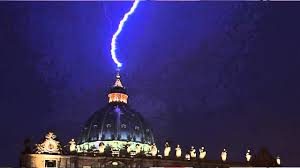Concerning the comments received on Overplaying the Heretical Hand, here is my clarification, for what it may be worth: The charge of heresy – a canonical and legal one – is not only serious, but, more to the point at hand, one that has to be indisputably proven, especially when a Pope is involved, preferably in written, propositional form, in the indicative mood.
Holding heretical opinions, even pushing a heretical agenda, is not the formal crime of heresy. It is not our task – at least, not our primary task – to determine whether or not the Pope be a ‘heretic’, but whether he has promulgated, in a definitive manner, a specific doctrine of heresy. We may surmise, ponder, pray, beseech, discuss, critique, analyze, assess, on how the Holy Father fulfills his office. But when theologians promulgate a letter accusing the Pope of formal heresy – a charge requiring fifteen pages of text, with accusations varying from Pope’s (deliberately?) ambiguous and tendentious statements, to appointing to influential positions those with controversial and shady pasts, and who do seem to hold erroneous opinions, to side-lining and demoting those more orthodox and conservative. If that be heresy, then any number of Popes in history may have been considered ‘heretics’, or close thereto.
Pope Francis may do all of this, and more, but God has protected His Church so far, even from His own Vicars, as the barque of Peter careens to and fro, and, as our Faith holds, He will continue to do so until the end of time. The gates of hell and all that…
Yet authors and signatories go even further, and end of the letter with the following dire exhortation:
If – which God forbid! – Pope Francis does not bear the fruit of true repentance in response to these admonitions, we request that you carry out your duty of office to declare that he has committed the canonical delict of heresy and that he must suffer the canonical consequences of this crime. These actions do not need to be taken by all the bishops of the Catholic Church, or even by a majority of them.
How many bishops are then required to carry out this scarcely veiled command to depose the Pope, which are implied in the scarcely ambiguous ‘canonical consequences’? An Abrahamic one, or five, or ten? Even if a ‘majority’ were admitted, would not this itself smack of the heresy of Conciliarism? Is not this final paragraph an exhortation to schism?
It is not enough to claim that schism is already here, or is on the way, so why not hurry things along, in some sort of Hegelian dialectic. If we are in an implicit schism, or if one is around the corner, then so be it. Such may be God’s permissive and punitive will. But let us – and by ‘us’, I mean those on the side of the angels, or truth and right conscience – not be the instigators thereof.
Father Thomas Weinanady, himself one so ‘side-lined’, has his own take on this matter, worth perusing, reinforcing the point I made, that this letter is likely to play into the hands of those who do want to re-make the Church in their own image. For this manifesto may well paint anyone who advocates any of its legitimate concerns as an ‘extremist’ who’s out to depose the Pope. As Father Weinandy rightly states, this is far bigger than Pope Francis – who will have his time and his tenure, for which he will go before God with his own conscience – but about the moral and doctrinal foundation of the Church herself, of which the current ambiguity and confusion is more a symptom than a cause.
Fidelity to the truth is all that is asked of us, and to express our views within the context of that same truth, with clarity and precision. When it comes to the tenure of Popes, let God take care of His Church how He wills, and in His own good time.


